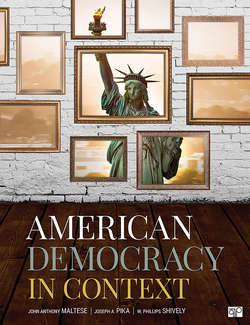Читать книгу American Democracy in Context - Joseph A. Pika - Страница 107
На сайте Литреса книга снята с продажи.
Dual Federalism
ОглавлениеDual federalism is an interpretation of federalism that favors states’ rights. It views the Constitution as a contract among preexisting states. Under the Constitution, these states willingly delegated certain powers to the new national government, but dual federalists believe that states retain all powers not specifically delegated.
Dual federalists also believe that the Constitution is a fixed document (rather than a “living” document that is subject to changing interpretations). They emphasize the Constitution’s clearly delineated express powers (such as Congress’s enumerated powers) and believe that the Constitution should be interpreted consistently over time.
Thus, they reject the idea that judges can use ambiguous language in the Constitution to augment the powers of the national government at the expense of the states. Therefore, they embrace a very narrow interpretation of Congress’s implied powers. To them, the necessary and proper clause allows only a very limited expansion of congressional power to do those things essential to carrying out the enumerated powers. There must, in other words, be a very direct link between enumerated and implied powers.
Dual federalists also firmly embrace the Tenth Amendment, which they believe stands as a significant limit on the power of the national government and an important protector of states’ rights. They believe that any actions of Congress that go beyond the enumerated powers and a very limited interpretation of the implied powers violate the Tenth Amendment. They further believe that the Supreme Court should employ the Tenth Amendment to rein in the national government and protect the prerogatives of the states.
When considering the relationship between the levels of government, dual federalists view the national government and the states as dual sovereigns—two relative equals, each of which is supreme in its own sphere.
Finally, dual federalists believe that the proper role of the Supreme Court is to act as an umpire between these two equals. It should uphold the right of the national government to exercise its express powers but strike down attempts by the national government to use broad readings of constitutional language to intrude upon the reserved powers of the states. They consider such attempts to be power grabs that violate the Tenth Amendment.
dual federalism An interpretation of federalism that favors states’ rights and regards states and the national government as “dual sovereigns” (two relative equals).
